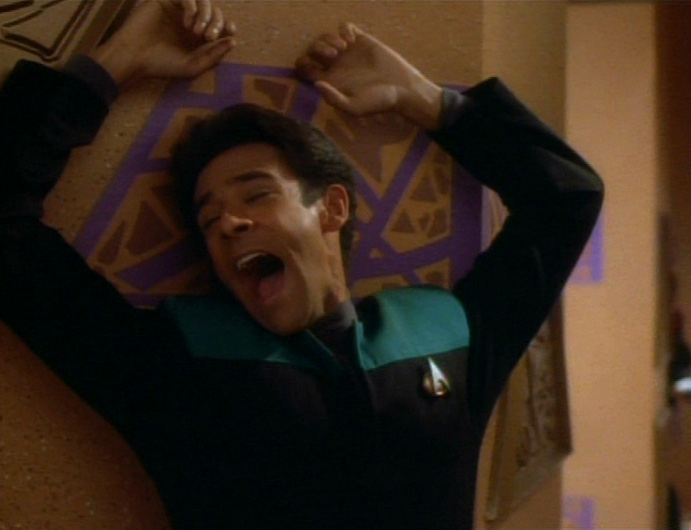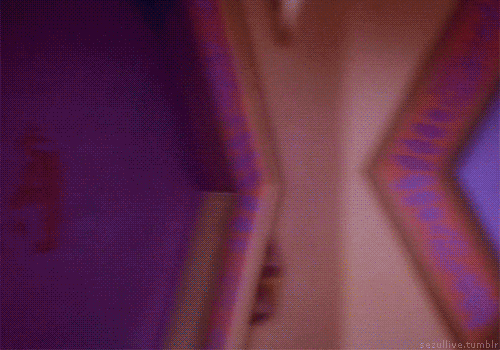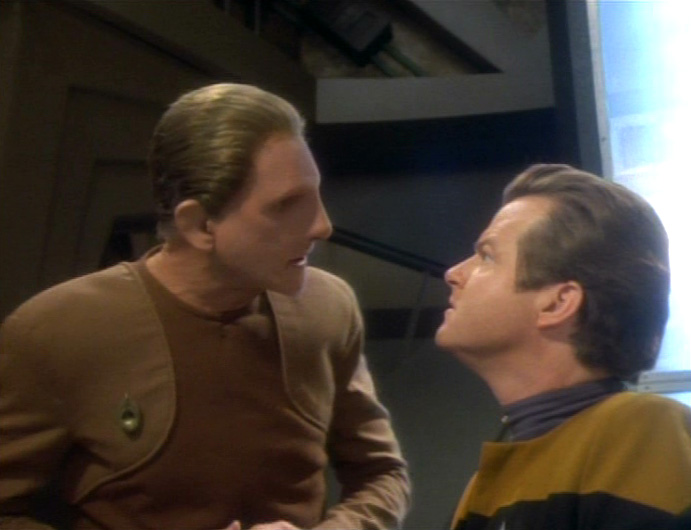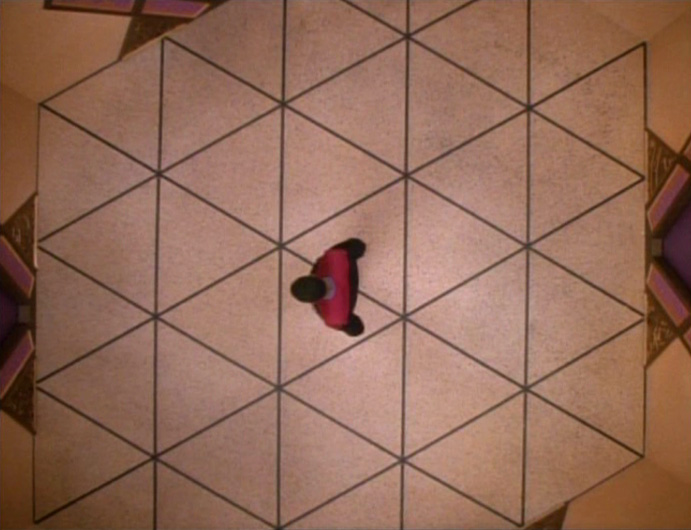First Shap
You wake up. You are lying on the floor in a yellow room. There are doors to the north, south, east, and west.
> inventory
You have your combadge, a tricorder, and no idea where you are.
You hear faint screaming from the south.
— from Star Trek: Deep Space Nine: Move Along Home: Chula: An Interactive Adventure Game, by Infocom (delayed indefinitely)
Second Shap
“Move Along Home” is an episode with a distinctly poor reputation. Unlike last week’s episode, which was terrible due to a hackneyed premise, unfortunate acting choices, and a general lack of ambition, “Move Along Home” can at worst be said to have a reach that exceeds its grasp. The game of chula that Sisko, Dax, Kira, and Bashir are transported into was originally conceived as a wild, expansive landscape, an absurdist maze reminiscent of Alice in Wonderland, in some drafts a surrealistic village with the main characters running around outdoors; due to the budget of a weekly syndicated television series, not to mention one that’s still making up the costs of its pilot, this was reduced to a soundstage consisting of a room and some corridors, made to look like a maze through editing and set dressing. This is common enough for a television show, and old hat for Star Trek, which has been furiously battering the upper edge of its budget from its beginning. There’s even a certain camp value in such a production, if one is inclined to forgive the shortcomings of a story that isn’t quite as ambitious as its production design.

Notoriously, Doctor Bashir is removed from the final act of “Move Along Home” so that Siddig El Fadil could appear in the B-plot of “Birthright,” the Next Generation episode that saw the Enterprise arrive at Deep Space Nine so that its crew could appear on DS9 sets and so that Bashir could give Data dreams with a strange device nebulously acquired in the Gamma Quadrant. Bashir also has a couple of nice moments with Data, first acting as a fan surrogate when he geeks out over meeting him, then bonding with him a little by asking about the things that make him seem human — his pulse, his breathing — rather than his computational power or anything else that marks him as different. Obviously no one could have known this at the time, but for Bashir to concentrate on Data’s quest to fit in while clearly having superior abilities in certain areas, and the behaviors Dr. Soong built into him to this end, plays into Bashir’s future characterization brilliantly.
This guest appearance was originally going to feature Dax, and Terry Farrell was very disappointed, to say the least (“I cried,” according to Captains’ Logs Supplemental), about not being able to appear due to filming commitments for “Move Along Home.” The episode, then, invites the question: why couldn’t it have been Dax, anyway? Aside from the completely accidental tie-in to Bashir’s future development, there’s no particular part of the appearance in “Birthright” that absolutely requires Bashir, and indeed the combination of TNG’s science officer with DS9’s science officer seems like the more obvious pairing. In “Move Along Home” Bashir doesn’t disappear for any reason that has anything to do with his character, while Dax merely spends the final act of the episode limping on an injured leg (and delivering the curiously out-of-character line “Seven lives is more than enough for a Trill”). As a viewer, it seems like the only reason it was deemed necessary to keep the characters in those roles was so that the injured crew member would be the only one out of the four in the chula game who is both a woman and not a soldier, as Kira was very recently. Dax is the safest character to force into the damsel-in-distress role, which doesn’t say anything good about “Move Along Home” as a story.

Not that Bashir gets off lightly. After waking up in the second shap of the chula labyrinth, Sisko finds Bashir screaming wildly to wake himself up from the nightmare he thinks he’s having. Sisko winds up mocking Bashir gently, suggesting that he can yell again rather than using his combadge if he’s in any danger, and the group seems to generally enjoy bringing some humility to the most arrogant among them. Not in a spiteful way, of course — no Starfleet officer would ever show spite or contempt — but in a good-natured way that shows that they really are starting to build a community among them.

Strike a pose!
Third Shap
Allamaraine, count to four
Allamaraine, then three more.
Allamaraine, just relax
Allamaraine, hey look, it’s Dax!
Allamaraine, I can’t rhyme
Allamaraine, all these lines!
Allamaraine, I need more
Allamaraine, syllables.
Fourth Shap
Space Hopscotch is inane. Everyone knows Space Hopscotch is inane. So the point of Space Hopscotch becomes the fact that it’s inane. It acts as a microcosm of the entire game, and the characters’ reaction to it: Kira tries to bulldoze through the level and runs into a forcefield, Bashir sees just one trend and runs into the same forcefield, Dax looks at the wider picture and discerns the rules they’re playing under, Sisko lets his people do their jobs, and among them, Kira is the most reluctant to indulge the Wadi in their insipid scheme. She draws the contrast between herself and the others as soon as they find out they’ve been abducted by the Wadi, emphasizing that while the Starfleet explorers must just love being caught up in whatever they’re caught up in (and indeed, later on Bashir remarks with wonder that the Wadi must be subjecting them to some kind of behavioral test, apparently believing he’s landed in an original series-era episode), she’s a Bajoran administrator, and did not sign up for any of this. (“Bajoran administrator” is an interesting way to put it — it’s probably just a slightly clumsy way of differentiating Kira without bringing up her past as a terrorist again.) While certainly not subtle, it’s a nice way of highlighting what makes Deep Space Nine its own show, and Nana Visitor does a great job of performing the Allamaraine dance sarcastically, including the step where she must salute.
Meanwhile, Odo is also chafing against Starfleet regulations in a couple of short scenes with Lieutenant George Primmin that turn out to be Primmin’s last on the show. In the span of two episodes, he’s gone from a threat sent in by high-ranking Starfleet decision-makers to a comically straight-laced and out-of-touch character who’s mainly present to be the subject of Odo’s sarcasm: “You can’t just go storming onto their ship without their permission.” “Oh, is that Starfleet policy? ” “That’s right.” “Well I’m not in Starfleet!” (Lieutenant Primmin clearly does not yet understand that laws may change depending on who’s making them, but justice is justice.) While Primmin had one moment toward the end of “The Passenger” where he transcended his by-the-book training and adopted a element of Odo’s methods, in “Move Along Home” he’s there to be berated by Odo for losing his commanding officer, mere minutes after Odo finds out that he’s lost his commanding officer.
Even in “The Passenger” Primmin came off as a first draft, an agent of conflict inserted into the show too soon, when the conflicting interests between the Starfleet and non-Starfleet characters still provides enough fodder that it doesn’t need to be supplemented yet. (And in this episode, a character who’s available to play a generic Starfleet role while O’Brien is absent for the third straight episode due to Colm Meany’s film commitments.) Here, Primmin gets what passes for his most memorable line in the show when he lends a down-home country pronunciation to “Con-stable O-do,” which, while unique for a security officer and for a DS9 character, is one measure of how memorable he ultimately is as a piece of the show.

Fifth Shap
At the beginning of the episode, Sisko is making a big deal of presenting himself and his crew in the best possible light — even though Doctor Bashir has misplaced his dress uniform, naturally — for the reception of the first formal delegation to arrive from the Gamma Quadrant. This is a matter of some importance that has been mentioned before, when first contact protocol was skipped in “Captive Pursuit” because the arrivals from the Gamma Quadrant didn’t care about it at all. The Wadi at least have the advantage of specifically intending to go through the wormhole; considering the importance that has been heaped on first contact previously in Deep Space Nine and in past episodes of The Next Generation, the opening minutes of the episode set expectations within a set of boundaries: first contact would be a disastrous event resulting in extended conflict and political tension (like the Federation’s first contact with the Klingons and Ferengi), or some sort of diplomatic snafu would provide an episode’s worth of tension, or diplomatic relations would serve as the backdrop for some other plotline. Falow, the leader of the Wadi delegation, immediately upends this by dismissing diplomatic relations and asking where he can find some games. For the second time within the span of a few episodes, a new species from the Gamma Quadrant has no concern for the first contact procedure that Starfleet holds in such high esteem; instead, they prefer to continue with their business regardless of any strangers they encounter. In “Captive Pursuit” Tosk’s only purpose was to evade the hunters and the hunters’ only purpose was to pursue Tosk; the new contact only served to complicate matters. The Wadi in “Move Along Home” appear to be more bored than anything else by the prospect of exploring another culture — other than that culture’s games, which may be new and interesting. This leaves open the question of whether Falow and his group stand as representations of their entire society, implying that it’s built around gaming, or whether he and they act as individuals who simply heard that they might have a good time at Quark’s.
The substitution of a tabletop game for formal diplomacy is surprisingly apt, though, assuming that Falow actually serves as an envoy for his people. In such a context, playing a group game should build community (moreso in a cooperative game), allow small dramas to play out in every turn, exemplify the analytic and strategic styles of each player, and show how each one goes about setting and achieving concrete goals. Diplomacy, after all, is a game in which separate powers attempt to use trust and dominance in discrete realms to further their interests, whether narrow or broad (as is Diplomacy). The game of chula falls somewhat short of this for the same reason that many alien games on Star Trek aren’t compelling — because it’s made up in order to provide particular plot points, it never feels like an actual game with organic rules and strategies. Quark appears to be the only one playing, with Falow acting as a guide (or maybe a DM, considering his appearances to the crew members within the game to lead them along) and all of the other Wadi acting as anonymous spectators. The relationship between the free will of the players inside the game and the choices that Quark makes is never adequately explored — before Quark knows that the crew members have been inserted into the game as his pieces, all he does is choose a path, roll a set of interesting d4, and watch as Falow announces with great portent the challenge facing his players…which Quark then has no role in resolving. His comments about the franchise potential for chula, then, ring more than a little hollow. (Actually, it would only make too much sense for the Wadi to tip the game against Quark, to make sure they teach him a lesson about cheating customers — at least, customers powerful enough to force him into a compromising position — as well as to find some entertainment in watching his reactions. The Gamma Quadrant is wondrous, with treasures to satiate desires both subtle and gross, but it’s not for the timid.)
Inside the game, meanwhile, chula is less of a tabletop game and more of an immersive video game, with progressions through several levels and clearly marked solutions to puzzles — anyone with any experience playing games will know that when all of the NPCs have drinks and are unaffected by poisonous smoke, you’ll need one of those drinks. (Especially with Falow appearing again to yell “Drink!”) The contrast and combination of the two styles of game is another aspect of the episode that ought to provide more depth than it ultimately does.
In another nice moment, Falow decides that the crew’s absolute failure at chula marks them as boring and promptly leaves, presumably to go back through the wormhole and find someone who can get a good game going. Starfleet may take new life and new civilizations very seriously, but sometimes those life forms and civilizations don’t return the favor.
Sixth Shap
The substitution of Quark for a diplomatic envoy is, of course, less apt, and Quark is as unlikely an envoy for the Alpha Quadrant as chula is for the Gamma Quadrant. As a capitalist, Quark’s standard operating procedure is to work around whatever rules he’s presented with in order to bend the various economic games he enters into to his will. This is a much different game than Sisko thinks he’s entering into at the beginning of the episode, when he compares first contact to a first date to try to begin talking to Jake about dating (respect is of utmost importance, which actually isn’t bad advice for alien contact or for dating); it’s also a different game than the Wadi think they’re entering into at the dabo table, where Quark’s ordinary cheating is taken as a great offense.
“Move Along Home” alternates between presenting Quark as a helpless figure treading water in a game he has no idea how to play (and therefore no idea how to cheat, or otherwise distort in his favor as he does all other areas of his life), and a veteran gambler finding his legs in a new challenge. He tries to take control by bringing Falow into his sphere, asking about franchising opportunities, but Falow resists the distraction and insists that the game go on. In one exchange with Odo after Quark chooses the more dangerous path, Odo points out that Quark is showing callous disregard for the crew members (three by this point, as Bashir has disappeared) just to make himself rich. Quark’s response is telling:
More than that! Look at the board. The shortcut skips a whole level. I’ve learned there are risks in every roll of the dice. This way, they can advance all the way home on just one move! Trust a gambler.
Quark doesn’t dispute that he’s potentially increasing his winnings, but insists that that’s a piece of a larger picture — that he can strategically increase his winnings while also getting the crew back. He also reasserts himself as an authority on risk, in games as in business as in life (categories that overlap considerably for a Ferengi), momentarily breaking out of the sitcom logic he’s operated under in episodes like “Babel” with a more serious, almost noble bearing. Of course, it immediately blows up in his face when his subsequent roll requires him to choose a player to sacrifice, and he breaks down sobbing as he pleads with Falow to end the game. The episode reverts, slightly, to the mechanics of a comedy, as Quark begs pathetically and Falow & Odo act as his straight men, peering over the edge of the table, lacking only a laugh track. Quark had a moment of seriousness, showing that the character and the actor both can carry such a moment, but is once again brought low.
When Quark loses his game of chula and the crew members are returned to the station, Falow reveals that they were never actually in any danger and delivers the episode’s punchline: “It’s only a game!” There is an argument that the show undercuts its drama, that by retroactively eliminating the risk to the characters the show invites viewers to wonder what the point of the episode they just watched was. However, the risk to a series regular is rarely serious in any circumstance, and viewers know this. Instead, the episode uses Quark and Odo to pivot back into sitcom logic at its end, so that Sisko’s righteous anger is redirected from Falow to Quark, Quark delivers one more laugh line (to Odo: “Oh, that’s right, you were here for the grovelling”), and Nana Visitor delivers one more look of exasperation before the episode is over.
In “Move Along Home” Quark is once again playing the role of instigator, most directly when he decides to cheat the Wadi out of their dabo winnings. Deep Space Nine has gone to this well many times already, and it’s easy to see why, as Quark is obviously the most devious of the main characters and the most willing to endanger everyone for a moment’s profit, as well as a character who can duck into sitcom logic to escape serious drama. At least, this is how Quark works in relation to the other characters; he’s still one of the major characters in the show, and next week DS9 takes its first look at Quark as the primary protagonist of an episode.
In the meantime…Move Along Home, move along hooooooome!
Star Trek: Deep Space Nine season one is available on DVD.
Screencaps courtesy of TrekCore.
All Star Trek articles on PTBN, including all episodes of Deep Space Nine covered thus far, can be found here.




